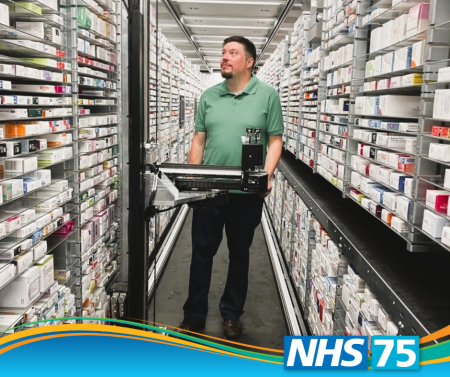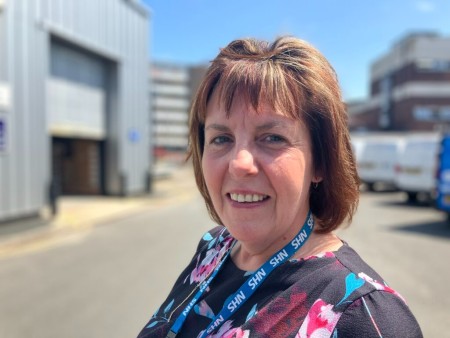Publish date: 28 June 2023

the robot in its stockroom
One of the latest recruits to the Pharmacy department at Blackpool Teaching Hospitals has two arms and not much else.
But what it lacks in body, the £400,000 robot more than makes up for in speed and accuracy.
“Our old robot served us faithfully for 14 years but it had come to the end of its working life,” said Director of Pharmacy Rebecca Bond. “The new one can process at least 120 requests an hour as well as being able to dispense medicines for secure collection when the department is closed overnight.”
Once pharmacy staff process a request for a medicine, the robot selects the box from the shelves, scans it to ensure it is the right medication and transports it upstairs to the Pharmacy Dispensary for further checking and dispensing.
The robot operates from a self-contained stockroom beneath the Pharmacy department. It can also restock itself overnight.
NHS hospitals spend £8 billion a year on patient medicines and it’s the job of inpatient pharmacy departments to dispense them.
Rebecca leads a team of 148 people serving Blackpool Victoria Hospital, Clifton Hospital and community services as well as a contracted out-of-hours on-call service.
Each year the team dispenses 276,000 packs of medicines. Most of these supplies go to inpatients with the aim of turning each request around in less than 90 minutes.

“It’s our job to make sure patients get their medicines on time and that they’re safe to use,” said Rebecca. “This includes providing advice on the safe use of medicines to patients and colleagues with the added support of our Medicines Information Helpline on 01253 953791 for more complex queries.”
Rebecca’s colleague, Angela Nelson, retired this month as Assistant Director of Pharmacy after 37 years with NHS, 26 of them at Blackpool.
“People see clinical work as being out on the wards but there’s so much more to pharmacy,” said Angela. Covid “was an opportunity to show more of our skills” such as leading and managing the urgent roll out of vaccines no one had ever used or handled before.



